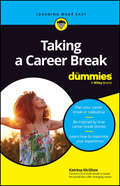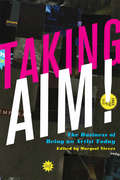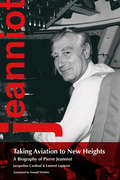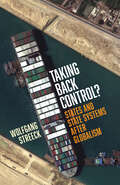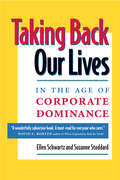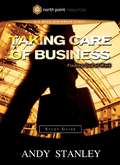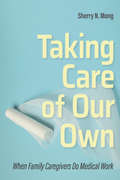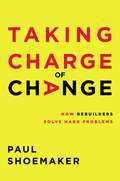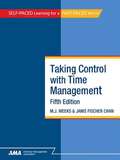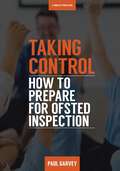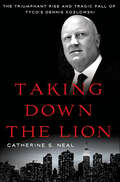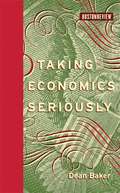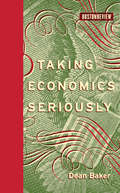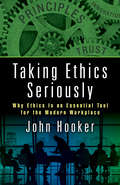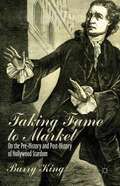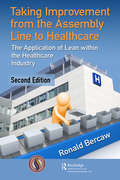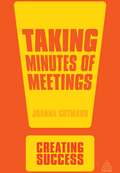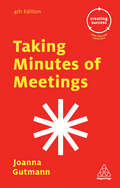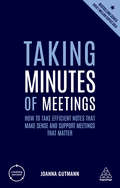- Table View
- List View
Takeovers and the European Legal Framework: A British Perspective
by Jonathan MukwiriSince the implementation of the European Directive on Takeover Bids, a European common legal framework governs regulation of takeovers in EU Members States. The European Directive on Takeover Bids was adopted in April 2004, and implemented in the UK and in other Member States on 20th May 2006. The Directive seeks to regulate takeovers by way of protecting investors, and harmonising takeover laws in Europe. In facilitating the restructuring of companies through takeovers, the Directive aims at reinforcing the free movement of capital. Takeovers and the European Legal Framework studies the European Community Directive on Takeover Bids, in order to provide greater understanding of both the impact and effect of the European legal framework of takeover regulation. It firstly looks at the Directive from a British perspective, focusing on the impact of the transposition of the Takeover Directive into the UK. The book examines the provisions of the City Code on Takeovers and Mergers, and discusses the takeover provisions in the Companies Act 2006 that implement the Takeover Directive in the UK, arguing that the Directive will provide a new basis for UK takeover regulation, and that the system will work well. Jonathan Mukwiri goes on to consider the Directive in relation to the EU, arguing that despite its deficiencies, in that Member States are free to opt to restrict takeovers, the Directive provides a useful legal framework by which takeovers are regulated in different jurisdictions. Mukwiri highlights how the freedoms of the EC Treaty and EU Directives interact, and the effects of the Takeover Directive on political considerations in the law-making process in European Community. Moreover, he argues that the future of EU takeover regulation is likely to follow the lead of the UK, making this book relevant to a wide range of policy makers and academics across Europe.
Taking A Career Break For Dummies
by Katrina McGheeTaking a career timeout could be the window of opportunity you’ve been looking for Taking A Career Break For Dummies shows you that a career break could be life-changing. Career breaks give us a chance to pause to identify opportunities and dreams, focus on the things we’ve been missing, and develop new skills. This book empowers you to take the leap into your next chapter. There are dozens of reasons you might want to do it, but whatever your circumstance, this friendly Dummies guide will help you value your own well-being, give yourself permission to grow and explore, and reclaim your time, your life, and your happiness. Develop your plan for taking a break from your career and for transitioning back when you’re ready Set a budget for your break, create a realistic timeline, and make it happen Access practical tools and resources to help you on your career break journey Build a positive mindset so you can enjoy your break and return to your career feeling renewedFor anyone looking for a new direction, feeling burned out, or longing to reignite that inner spark, Taking a Career Break For Dummies is a must. If you’re looking for help structuring your planned time off, you’ll also love the hands-on guidance and examples inside.
Taking AIM!: The Business of Being an Artist Today
by Marysol NievesTaking Aim! The Business of Being an Artist Today is a practical, affordable resource guide filled with invaluable advice for the emerging artist. The book is specially designed to aid visual artists in furtheringtheir careers through unfiltered information about the business practices and idiosyncrasies of the contemporary art world. It demystifies often daunting and opaque practices through first-hand testimonials, interviews, and commentary from leading artists, curators, gallerists, collectors, critics, art consultants, arts administrators, art fair directors, auction house experts, and other art world luminaries.Published in celebration of the 30th anniversary of Artist in the Marketplace (AIM)—the pioneering career development program at the Bronx Museum of the Arts—Taking AIM! The Business of Being an Artist Today mirrors the structure and topics featured in the AIM program’s weekly workshops and discussions. Each chapter focuses on the specific perspective of an “art world insider”—from the artist to the public art program director to the blogger. Multiple viewpoints from a range of art professionals provide emerging artists with candid, uncensored information and tools to help them better understand this complex field and develop strategies for building and sustaining successful careers as professional artists.The book ends with an annotated chronology of the past three decades in the contemporary art field and a bibliography of publications, magazine articles, online sources, funding sources, residency programs, and other useful information for emerging artists.
Taking Action: Making Innovation Pay
by John Butman Harold L. Sirkin James P. AndrewIf you are committed to improving your company's payback from innovation, this chapter provides some specific and practical steps you can take to get started on the journey.
Taking Aviation to New Heights: A Biography of Pierre Jeanniot
by Jacqueline Cardinal Laurent LapierreTo chart the inspiring journey of Pierre Jeanniot is to trace the remarkable development of the air transport industry. In his youth, Jeanniot survived the bombing of Rome, the occupation of France, and was a witness to the Resistance in the Jura Mountains. In 1963, after the Sainte-Thérèse air tragedy and the threat of finding himself jobless, Jeanniot was inspired to create the famous Black Box, which has since become a pillar of aviation security. Under his direction, Air Canada chose the Airbus rather than the Boeing to renew its fleet, in the midst of a highly visible political crisis. Against all odds, Jeanniot also orchestrated the successful privatization of the airline. His visionary speech at Amman, delivered when he was at the helm of the International Air Transport Association (IATA), laid out modern aviation’s most urgent priorities regarding accident prevention, protection of the environment, and technological progress. A master of logistics, he successfully negotiated the impasse in the skies following the September 11 terrorist attacks and handled the many complications that came in their wake. Pierre Jeanniot’s influence has been felt far beyond the aviation world. His longstanding desire to facilitate access to higher learning led him to participate actively in the founding of the Université du Québec. A skilled diplomat, he also helped to resolve political problems in Iran, Libya, North Korea, and the Middle East. Taking Aviation to New Heights is the story of a great leader who has left an indelible mark on his milieu. He has truly piloted aviation to new heights. - This book is published in English
Taking Back Control?: States and State Systems After Globalism
by Wolfgang StreeckTaking back control? States and state systems after globalizationThe era of hyperglobalization once hailed as the 'end of history' was characterised by boundless capitalist expansion. The neoliberal revolution gave rise to a politics of scale aimed at the centralization and unification of states and state systems: the replacement of national with global governance or, in Europe, of the nation-state with a supranational superstate, the European Union.The 'New World Order' proclaimed by the United States in the wake of the Soviet collapse proved to be ungovernable by democratic means. Instead, it was ruled through a combination of technocracy and mercatocracy, failing spectacularly to provide for political stability, social legitimacy and international peace. Marked by a series of economic and institutional crises, hyperglobalization gave rise to various kinds of political countermovements that rebelled against and ultimately stopped the upward transfer of state authority in its tracks.This book analyses the ongoing tug-of-war between the forces of globalism and democracy, of centralization and decentralization, and unification and differentiation of states and state systems, and how they are tied to the advance of global capitalism and the prospects for its social and democratic regulation.Exploring the possibility for states and the societies they govern to take back control over their collective fate, the book is an attempt at a renewed theory of the state in political economy. Inspired by the work of Karl Polanyi and John Maynard Keynes, it discusses the potential outlines of a state system allowing for democratic governance within and peaceful cooperation between sovereign nation-states.
Taking Back Our Lives in the Age of Corporate Dominance
by Suzanne Stoddard Ellen AugustineReveals the profound impact of the global corporate economy on our daily lives Details 75 immediate and long-term Action Steps for empowering ourselves both individually and as a society Offers specific tips, ideas, and resources on how to pare down our lives and open up our time Provides questions for reflection that help readers to think in new ways about what matters most to them Corporate structures, products, and processes permeate our society -but what do they really mean to us in our daily lives? The bottom-line mentality that drives corporate America, say Ellen Augustine (formerly Schwartz) and Suzanne Stoddard, is creating a world unresponsive to human needs, corrosive to the democratic process, and destructive to the planet itself. Taking Back Our Lives in the Age of Corporate Dominance shows the links between our mundane everyday struggles and the global corporate economy, image-driven media, and the relentless pace which consumes us all. And it tells us how we can change things by transforming both our work and leisure. The authors use hard-hitting examples and illuminating personal vignettes about confronting fear, anger, death, family problems, and the stultifying effects of staying in the "comfort zone." They detail over 75 steps for personal and societal actions-some quick and immediate, others in-depth and long term-for retaking control of our lives. The authors include provocative questions for reflection that shock, prod, and jump-start the reader into thinking about what matters most to them. Deeply moving, outrageous, encouraging, compelling, and inspiring, Taking Back Our Lives in the Age of Corporate Dominance blends unrelenting candor with the comfort of real-life stories of hope-and ultimately shows us that choice is the most important tool we have for reviving our lives and our world.
Taking Care of Business Study Guide: Finding God at Work
by Andy StanleyWhat Does the Boss Have to Say? Work. For most people, it's a necessity. For some, it's a passion. And for others, it's a four-letter word to be avoided as much as possible. In this DVD and accompanying study guide from North Point Resources, readers will come to grasp the one perspective on work that really matters:God's. He ordained it and He laid out specific guidelines enabling workers to achieve maximum success and fulfillment. In each session, Andy Stanley offers insights on common, specific problem areas people have, from dealing with coworkers and superiors, to boldly living the Christian faith, to balancing work and family. Your Guide from 9:00 to 5:00 Work. For most people, it's a necessity. For some, it's a passion. And for others, it's a four-letter word to be avoided when possible. But for all of us, only one perspective on work really matters: God's. He ordained it and He laid out specific guidelines for us to achieve maximum success and fulfillment while on the job. Designed for small group or personal use, this companion study guide to theTaking Care of BusinessDVD addresses specific problem areas we're all familiar with-from dealing with coworkers and superiors while exemplifying Christ, to balancing our work and home life. This study guide is complete with a leader's guide and six lessons, including easy-to-do exercises and discussion questions. Story Behind the Book A new addition to the North Point Resources brand group from a series taught by Andy Stanley at North Point Community Church .
Taking Care of Our Own: When Family Caregivers Do Medical Work (The Culture and Politics of Health Care Work)
by Sherry N. MongMixing personal history, interviewee voices, and academic theory from the fields of care work, the sociology of work, medical sociology, and nursing, Taking Care of Our Own introduces us to the hidden world of family caregivers. Using a multidimensional approach, Sherry N. Mong seeks to understand and analyze the types of skilled work that family caregivers do, the processes through which they learn and negotiate new skills, and the meanings that both caregivers and nurses attach to their care work.Taking Care of Our Own is based on sixty-two in-depth interviews with family caregivers, home and community health care nurses, and other expert observers to provide a lens through which in-home care processes are analyzed, while also exploring how caregivers learn necessary procedures. Further, Mong examines the emotional labor of caregiving, as well as the identities of caregivers and nurses who are key players in the labor process, and gives attention to the ways in which the labor is transferred from medical professionals to family caregivers.
Taking Charge of Change: How Rebuilders Solve Hard Problems
by Paul ShoemakerThe model to meet the unprecedented challenges unique to the decade ahead and make a remarkable impact on people&’s lives—led by the success stories of 38 change leaders whose paths of action give you the blueprint.To meet the radically different challenges of inequity, division, and scarcity of resources that will only increase over the next ten years, the most successful and valuable leaders are those with the traits to be rebuilders.Thought leader Paul Shoemaker profiles 38 rock star rebuilders so you have a model to follow, including Peter Drucker Award winner Rosanne Haggerty, whose goal is to end chronic homelessness; Trish Millines, who has changed lives for kids of color in high tech; and David Risher, whose cross-sector approach is helping solve global illiteracy.Page by page, the common elements rebuilders utilize to make a remarkable impact on some or our most complex problems are highlighted as you: Learn the 5 vital traits change leaders use to solve big problems.Gain new perspective from relevant research, data, leadership lessons, and 3 case studies that illuminate the path ahead.Meet the leaders setting the standard for social change impact, all shared in Shoemaker&’s signature storytelling style.Taking Charge of Change is written for anyone seeking to be the driver of real change and an integral part of rebuilding the structures and foundations of American communities and companies throughout the decade ahead.
Taking Control with Time Management
by M. J. Weeks Janis Fisher ChanHow to balance the demands of work and personal life. Apply the tools and techniques in this book to meet contemporary time challenges and balance the demands of work and personal life. Now packed with exercises and application tools, this up-to-the-minute revision of the classic gives you proven time management strategies to increase your productivity and your efficiency. You�ll discover how to use effective systems for setting and achieving your goals and reducing on-the-job stress. You will learn how to: � Conduct a personal time audit � Conquer time wasters, including pitfalls of e-mail, cell phones, and the Internet � Delegate appropriately and effectively � Set SMART goals and establish priorities � Uncover the time you need for planning, supervising, and decision making � Manage information overload and avoid �wired stress� � Schedule and conduct well-run meetings that focus on effective actions and goals � Maximize the returns on your telephone, travel, and meeting times � Use team time more productively � Set up and implement a Time Management Plan � Make changes that will reduce stress and add balance to your life
Taking Control: How To Prepare For Ofsted Under The Education Inspection Framework
by Paul GarveyOfsted don't allow their inspectors to offer advice to schools. But as a former inspector, Paul Garvey is able to use his experience to help headteachers prepare for inspections in order to help every school gain the grade it feels it deserves. His book is full of invaluable insights, gathered from years of experience in inspecting thousands of different schools. He takes readers step-by-step through what schools need to be doing (and not doing!) in advance to prepare, and then walks readers through the inspection process from both the school's and inspector's point of view. Paul refers regularly to Ofsted's School Inspection Handbook in order to link his advice to the grading criteria. And finally, he guides readers on writing their self-evaluation form. This book is a must have for any senior leadership team with an inspection due.
Taking Control: How To Prepare For Ofsted Under The Education Inspection Framework
by Paul GarveyOfsted don't allow their inspectors to offer advice to schools. But as a former inspector, Paul Garvey is able to use his experience to help headteachers prepare for inspections in order to help every school gain the grade it feels it deserves. His book is full of invaluable insights, gathered from years of experience in inspecting thousands of different schools. He takes readers step-by-step through what schools need to be doing (and not doing!) in advance to prepare, and then walks readers through the inspection process from both the school's and inspector's point of view. Paul refers regularly to Ofsted's School Inspection Handbook in order to link his advice to the grading criteria. And finally, he guides readers on writing their self-evaluation form. This book is a must have for any senior leadership team with an inspection due.
Taking Down Goliath
by Kevin M. Ryan Rob Spider" GrahamAdvances in software, auction-based media, analytics, and big data have made it possible for the average marketer to compete with marketers with 100 times the spending power. Taking Down Goliath profiles the ways in which digital marketing can level the playing field, if you know how to use it.
Taking Down the Lion: The Triumphant Rise and Tragic Fall of Tyco's Dennis Kozlowski
by Catherine S. NealTaking Down the Lion offers an inside look at the career of Tyco's most infamous CEO, and what exactly brought him down so publicly.As the widely-admired CEO of Tyco International, Dennis Kozlowski grew a little-known New Hampshire conglomerate into a global giant. In a stunning series of events, Kozlowski suddenly lost his job along with his favored public status when he was indicted by legendary Manhattan DA Robert Morgenthau—it was an inglorious end to an otherwise brilliant career. Kozlowski was the face of corporate excess in the turbulent post-Enron environment; he was pictured under headlines that read "Oink Oink," and publicly castigated for his extravagant lifestyle. "Deal-a-Day Dennis" was transformed into the "poster child for corporate greed." Kozlowski was ultimately convicted of grand larceny and other crimes that, in sum, found the former CEO guilty of wrongfully taking $100 million from Tyco.Taking Down the Lion shines a bright light on former CEO Dennis Kozlowski and the Tyco corporate scandal—it is the definitive telling of a largely misunderstood episode in U.S. business history. In an unfiltered view of corporate America, Catherine S. Neal pulls back the curtain to reveal a world of big business, ambition, money, and an epidemic of questionable ethics that infected not only business dealings but extended to attorneys, journalists, politicians, and the criminal justice system. When the ugly truth is told, it's clear the "good guys" were not all good and the "bad guys" not all bad. And there were absolutely no heroes.
Taking Economics Seriously
by Dean BakerThere is nothing wrong with economics, Dean Baker contends, but economists routinely ignore their own principles when it comes to economic policy. What would policy look like if we took basic principles of mainstream economics seriously and applied them consistently? In the debate over regulation, for example, Baker--one of the few economists who predicted the meltdown of fall 2008--points out that ideological blinders have obscured the fact there is no "free market" to protect. Modern markets are highly regulated, although intrusive regulations such as copyright and patents are rarely viewed as regulatory devices. If we admit the extent to which the economy is and will be regulated, we have many more options in designing policy and deciding who benefits from it. On health care reform, Baker complains that economists ignore another basic idea: marginal cost pricing. Unlike all other industries, medical services are priced extraordinarily high, far above the cost of production, yet that discrepancy is rarely addressed in the debate about health care reform. What if we applied marginal cost pricing--making doctors' wages competitive and charging less for prescription drugs and tests such as MRIs? Taking Economics Seriouslyoffers an alternative Econ 101. It introduces economic principles and thinks through what we might gain if we free ourselves from ideological blinders and get back to basics in the most troubled parts of our economy. A Boston Review Book
Taking Economics Seriously (Boston Review)
by Dean BakerA leading economist's exploration of what our economic arrangements might look like if we applied basic principles without ideological blinders. There is nothing wrong with economics, Dean Baker contends, but economists routinely ignore their own principles when it comes to economic policy. What would policy look like if we took basic principles of mainstream economics seriously and applied them consistently? In the debate over regulation, for example, Baker—one of the few economists who predicted the meltdown of fall 2008—points out that ideological blinders have obscured the fact there is no “free market” to protect. Modern markets are highly regulated, although intrusive regulations such as copyright and patents are rarely viewed as regulatory devices. If we admit the extent to which the economy is and will be regulated, we have many more options in designing policy and deciding who benefits from it. On health care reform, Baker complains that economists ignore another basic idea: marginal cost pricing. Unlike all other industries, medical services are priced extraordinarily high, far above the cost of production, yet that discrepancy is rarely addressed in the debate about health care reform. What if we applied marginal cost pricing—making doctors' wages competitive and charging less for prescription drugs and tests such as MRIs? Taking Economics Seriously offers an alternative Econ 101. It introduces economic principles and thinks through what we might gain if we free ourselves from ideological blinders and get back to basics in the most troubled parts of our economy.
Taking Ethics Seriously: Why Ethics Is an Essential Tool for the Modern Workplace
by John HookerThis book develops an intellectual framework for analyzing ethical dilemmas that is both grounded in theory and versatile enough to deal rigorously with real-world issues. It sees ethics as a necessary foundation for the social infrastructure that makes modern life possible, much as engineering is a foundation for physical infrastructure. It is not wedded to any particular ethical philosophy but draws from several traditions to construct a unified and principled approach to ethical reasoning. Rather than follow the common academic practice of seeking a reflective equilibrium of moral intuitions and principles, it builds on a few bedrock principles of rational thought that serve as criteria for valid argumentation. It develops the ideas from the ground up, without presupposing any background in ethics or philosophy. Epistemologically, the book views ethics as parallel to mathematics, in that it relies on generally accepted proof techniques to establish results. Whereas mathematics rests on such proof paradigms as mathematical induction and proof by contradiction, ethics can be seen as relying on proof by applying consistency tests, such as generalizability and respect for autonomy. Utilitarianism also plays a key role, but it is reconceived as a deontological criterion. This approach obviously requires that these criteria be formulated more rigorously than is normally the case. To accomplish this, the book begins with the classical idea that an action is distinguishable from mere behavior by virtue of its having a coherent rationale, where coherence requires passing certain consistency tests such as generalizability. An action is therefore inseparable from its rationale, and generalizability is defined in terms of consistency with the rationale. A utilitarian criterion receives a similar treatment with respect to a means-end rationale. Respect for autonomy is grounded in a carefully developed action theory that takes into account such concepts as joint autonomy, implied consent, and the permissibility of interference with unethical behavior. It provides an account of responsibility that is both practical and theoretically satisfying, and it yields a novel solution of the much-discussed trolley car dilemmas. The book is written for a general audience and strives to be as readable and engaging as possible, while maintaining rigor. It begins by dispelling a raft of misconceptions that trivialize ethics and block its development as an essential tool of modern life, such as the notion that ethics is just a matter of opinion without rational foundation. After presenting the ethical principles just described, along with many examples, it provides several chapters that analyze real-life dilemmas, many obtained from the author’s students and professional workshop participants. One cannot understand physics or chemistry without seeing how their principles are applied to real problems, and the same is true of ethics. These chapters demonstrate that a unified normative theory can deal with a wide range of real cases while achieving a reasonable level of objectivity and rigor.
Taking Fame to Market
by Barry KingThis book explores, from a sociological perspective, the relationship between acting as symbolic work and the commercialization of popular culture. Particular attention is paid to the social conditions that gave rise to stardom in the theatre and cinema, and how shifts in the marketing of stars have impacted upon contemporary celebrity culture.
Taking Flight: Making Your Center for Teaching and Learning Soar
by Laura Cruz Brian Smentkowski Michele A. Parker Marina SmithermanTaking Flight synthesizes research on best practices for running centers of teaching and learning, providing practical guidance and resources for educational developers who are looking to open new centers; revitalize an underperforming center; or sustain and enhance an effective center. The authors offer the necessary background, relevant examples, and practical exercises specifically designed to support the sustained vitality of educational development and its role in fostering organizational change. The book is practical in nature, with step sheets, diagrams, and similar materials designed to facilitate reflection and application. The book guides educational developers in enhancing and applying their knowledge, skills and abilities to establish a leadership role which, in turn, will enable them to play a pivotal role in translating visionary strategies into meaningful actions across their respective campuses. An effective, well-managed center for teaching and learning has the potential to benefit its institution’s faculty, staff, students, and community members. Through fostering a productive relationship with campus administration, centers can improve morale, contribute to shaping and achieving institutional learning mission and outcomes, enhance institutional reputation, and make a contribution to the practice of teaching and learning across the academy. The materials in Taking Flight were honed through a series of national workshops developed under the aegis of the POD Network – the professional organization for educational developers in the United States. This book answers a need for a resource for directors and staff of centers that has been identified by leaders in the field. It also provides valuable context for all leaders concerned about student learning and the improvement of teaching.
Taking Improvement from the Assembly Line to Healthcare: The Application of Lean within the Healthcare Industry
by Ronald G. BercawQuality healthcare is a cornerstone of any healthy society. In the U.S., we have access to sophisticated medical technology, world renowned physicians, highly trained nurses and hospital personnel, advanced pharmaceuticals, and innovations in diagnosis and treatment. But for all of our sophistication, serious problems afflict healthcare systems across the U.S. today – problems that cause severe hardship for families in communities large and small. Considering its impact on society, healthcare is arguably our most important industry. Good health is a key aspect of a productive and fulfilling life no matter what a person’s age, cultural background, social status or career. To live well and provide for ourselves and others, we all depend on a strong healthcare system that can help us prevent illness and access effective treatment when we need it. Needless to say, building and maintaining that robust healthcare system is no easy task. According to a report by the Institute of Medicine, up to 98,000 deaths per year occur in U.S. hospitals as a result of adverse events. In other words, errors in hospitals cause more annual deaths than acceptable and are totally preventable. With the healthcare system in such critical condition, Lean is the best possible treatment as it moves to eliminate waste and improve processes. The revised edition of Taking Improvement from the Assembly Line to Healthcare supplies step-by-step guidance on how to implement Lean methods to achieve world-class improvement with the healthcare industry. The updated edition of this Shingo award winner book provides specific examples of Lean implementation in emergency medicine, diagnostic imaging, orthopedic clinics, general internal medicine, administration, and community care. Highlighting quality, safety, and financial evidence as to why immediate change is both possible and essential, the book provides a firm foundation in Lean improvement and the tools used to deliver sustainable solutions. This revised edition presents new and updated client interviews and how the process has changed or been enhanced, what worked and what didn’t work. New case studies from U.S. and Canada provide readers with the real-world understanding needed to embark and sustain a successful improvement journey.
Taking Minutes of Meetings
by Joanna GutmannThe minute-taker is one of the most important and powerful people in a meeting and they should use this opportunity to develop knowledge, broaden horizons and build credibility within the organization. Taking Minutes of Meetings, 3rd edition is an easy to read 'dip-in, dip-out' guide which shows you how to confidently arrange meetings and produce minutes. It provides hands-on advice about the sections of a meeting as well as tips on how to create an agenda, personal preparation, best practice advice on taking notes and how to improve your accuracy. Brand new chapters include guidance on using technology to maximize effectiveness and practical help with taking minutes for a variety of different types of meetings.
Taking Minutes of Meetings
by Joanna GutmannTaking Minutes of Meetings guides you through the entire process behind minute taking: arranging the meeting; writing the agenda; creating the optimum environment; structuring the meeting and writing notes up accurately.The minute-taker is one of the most important and powerful people in a meeting and you can use this opportunity to develop your knowledge, broaden your horizons and build credibility within the organization. Taking Minutes of Meetings is an easy to read 'dip-in, dip-out' guide which shows you how to confidently arrange meetings and produce minutes. It provides hands-on advice about the sections of a meeting as well as tips on how to create an agenda, personal preparation, best practice advice on taking notes and how to improve your accuracy. Brand new chapters of this 4th edition include guidance on using technology to maximize effectiveness and practical help with taking minutes for a variety of different types of meetings. The creating success series of books...With over one million copies sold, the hugely popular Creating Success series covers a wide variety of topics and is written by an expert team of internationally best-selling authors and business experts. This indispensable business skills collection is packed with new features, practical content and inspiring guidance for readers across all stages of their careers.
Taking Minutes of Meetings: How to Take Efficient Notes that Make Sense and Support Meetings that Matter (Creating Success #75)
by Joanna GutmannTaking Minutes of Meetings guides you through the entire process of minute taking: arranging the meeting; writing the agenda; creating the optimum environment; structuring the meeting and writing notes up accurately. The often misunderstood role of minute-taker is one of the most important and powerful in a meeting, and this book will help you excel at this crucial skill, allowing you to build your career and credibility. Taking Minutes of Meetings is an easy to read 'dip-in, dip-out' guide, providing hands-on advice about the sections of a meeting as well as tips on how to create an agenda, personal preparation, best practice advice on taking notes and how to improve your accuracy. Fully updated for 2019, this 5th edition now features even more practical exercises, useful templates, and top tips, as well as guidance on using technology effectively and minutes for different types of meetings.The Creating Success series of books...Unlock vital skills, power up your performance and get ahead with the bestselling Creating Success series. Written by experts for new and aspiring managers and leaders, this million-selling collection of accessible and empowering guides will get you up to speed in no time. Packed with clever thinking, smart advice and the kind of winning techniques that really get results, you'll make fast progress, quickly reach your goals and create lasting success in your career.

